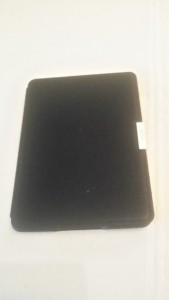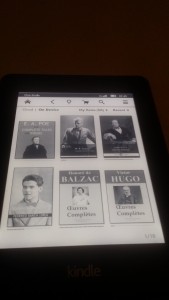In François Truffaut’s science fiction film Fahrenheit 451, a totalitarian regime’s war on books is resisted by characters who become banned works of literature by learning them by heart. Today, in what a decade ago would have seemed a similar piece of science fiction, I can carry around with me at all times an ever-expanding library of world literature, books that are readable on a minuscule screen where I can read in comfort adjusting brightness and font size.
And books that are more than books as we have understood them in the past! My portable library now includes the complete works of Charles Dickens, Walter Scott, Honoré de Balzac, Victor Hugo and Emile Zola, the complete tales and poems of Edgar Allan Poe, and the complete poems and/or plays of William Wordsworth, Lord Byron, W.B. Yeats, Oscar Wilde, Charles Baudelaire and Federico García Lorca, each author in one single file and in many cases acquired for less than 2 euros apiece – prices too that seem like science fiction! Not to mention the Bible, the complete works of Shakespeare, the Quijote, the Bhagavad Gita, the Tao Te Ching, Hans Andersen and the Brothers Grimm, the Alice books and Le Petit Prince, Portugal’s Fernando Pessoa, Hispanic women authors such as Mexico’s Rosario Castellanos and Galicia’s Rosalía de Castro, and more … some 50 items, already the equivalent of several hundred volumes of conventional books.
The library includes books in four languages that I read, English, French, Spanish and Portuguese. For each language there is a dictionary, and I can look up unfamiliar words directly from the text, thus enriching both the reading experience and my vocabulary in whatever language, my own included!
This is, of course, all thanks to Amazon’s invention of the Kindle. Yes, it is proprietary hardware and software, and yes, there are unresolved logistic and quality issues. As a resident in Luxembourg, I was obliged by Amazon to acquire my Kindle from Germany, and I can only download books from Amazon’s French site, which, even though it has no lack of books in languages other than French, is not ideal.
Amazon’s Kindle site is not fully attuned to scholarly values: it tends not to offer full details of particular editions, and trial-and-error cancellation and replacement sometimes prove necessary for securing the right user-friendly edition of a book or author. Some books may be scanned copies with errors; others may lack a table of contents, impeding easy search; one academic book I bought at full price failed to synchronise between endnotes and note numbers, requiring complex search every time I wanted to read a note.
Still, as a recent Kindle convert I am absolutely clear that the advantages greatly outweigh the drawbacks. The contents of my Kindle account are available not only on my Kindle proper but also on my PC and mobile phone. This makes the library virtually indestructible, with everything on three devices at once. On the dedicated Kindle screen or on my smartphone, books can be read anywhere, on the bus or train or in a restaurant, and all but weightlessly.
I am sure I am reading more now that I have a Kindle: technology and reading need not be enemies. The uses and advantages are manifold. I have just got Yeats’ poem ‘The Second Coming’ perfectly by heart with help from the Kindle, and see how useful it is for reinforcing learning tasks. The classic Kindle is not Web-enabled, other than for Amazon’s own site and a slimmed-down version of Wikipedia. For children, this means parents can trust them with the device, and its ‘modern’ feel should help turn them on to reading books. And, to return to where I began and the totalitarianism evoked in Fahrenheit 451, at a time when priceless libraries are being destroyed in the Middle East, the sheer portability and compactness of the Kindle promise to make it a weapon, if necessary, for the preservation of literature against future enemies of thought. The screen is mightier than the sword!

